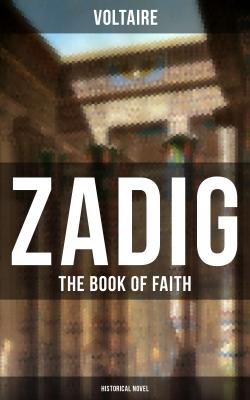ZADIG - The Book of Faith (Historical Novel). Вольтер
Читать онлайн.| Название | ZADIG - The Book of Faith (Historical Novel) |
|---|---|
| Автор произведения | Вольтер |
| Жанр | Языкознание |
| Серия | |
| Издательство | Языкознание |
| Год выпуска | 0 |
| isbn | 9788075835956 |
Voltaire
ZADIG - The Book of Faith
(Historical Novel)
A Story from Ancient Babylonia
Published by
Books
- Advanced Digital Solutions & High-Quality eBook Formatting -
2017 OK Publishing
ISBN 978-80-7583-595-6
Table of Contents
VOLTAIRE: HIS LIFE AND WORKS (Biography)
ZADIG
VII. The Disputes And The Audiences.
Approbation.
I, the underwritten, who have obtained the character of a learned, and even of an ingenious man, have read this manuscript, which, in spite of myself, I have found to be curious, entertaining, moral, philosophical, and capable of affording pleasure even to those who hate romances. I have therefore decried it; and have assured the cadi-lesquier that it is an abominable performance.
Epistle Dedicatory To The Sultana Seraa.
The 18th of the month Schewal, in the 837th year of the Hegira.
Delight of the eyes, torment of the heart, and light of the mind, I kiss not the dust of thy feet, because thou never walkest; or walkest only on the carpets of Iran, or in paths strewn with roses.
I offer thee the translation of a book, written by an ancient sage, who, having the happiness to have nothing to do, amused himself in composing the History of Zadig; a work which performs more than it promises.
I beseech thee to read and examine it; for, though thou art in the spring of life, and every pleasure courts thee to its embrace; though thou art beautiful, and thy beauty be embellished by thy admirable talents; though thou art praised from morning to evening, and, on all these accounts, hast a right to be devoid of common sense, yet thou hast a sound judgment and a fine taste; and I have heard thee reason with more accuracy than the old dervises, with their long beards and pointed bonnets.
Thou art discreet without being distrustful; gentle without weakness; and beneficent with discernment. Thou lovest thy friends, and makest thyself no enemies. Thy wit never borrows its charms from the shafts of detraction. Thou neither sayest nor doest any ill, notwithstanding that both are so much in thy power.
In a word, thy soul hath always appeared to me to be as pure and unsullied as thy beauty. Besides, thou hast some little knowledge in philosophy, which makes me believe that thou wilt take more pleasure than others of thy sex in perusing the work of this venerable sage.
It was originally written in the ancient Chaldee, a language which neither thou nor I understand. It was afterward translated into the Arabic, to amuse the famous sultan Oulougbeg, much about the time that the Arabians and the Persians began to write the Thousand and One Nights, the Thousand and One Days, etc.
Ouloug was fond of reading Zadig, but the sultanas were fonder of the Thousand and One. "How can you prefer," said the wise Ouloug to them, "those stories which have neither sense nor meaning?" "It is for that very reason," replied the sultanas, "that we prefer them."
I flatter myself that thou wilt not resemble these, thy predecessors; but that thou wilt be a true Ouloug. I even hope, that when thou art tired with those general conversations, which differ from the Thousand and One in nothing but in being less agreeable, I shall have the honor to entertain thee for a moment with a rational discourse.
Hadst thou been Thalestris in the time of Scander, the son of Philip; hadst thou been the Queen of Sheba in the time of Solomon; these are the very kings that would have paid thee a visit.
I pray the heavenly powers, that thy pleasures may be unmixed, thy beauty never fading, and thy happiness without end.
SADI.
I.
The Blind Of One Eye.
